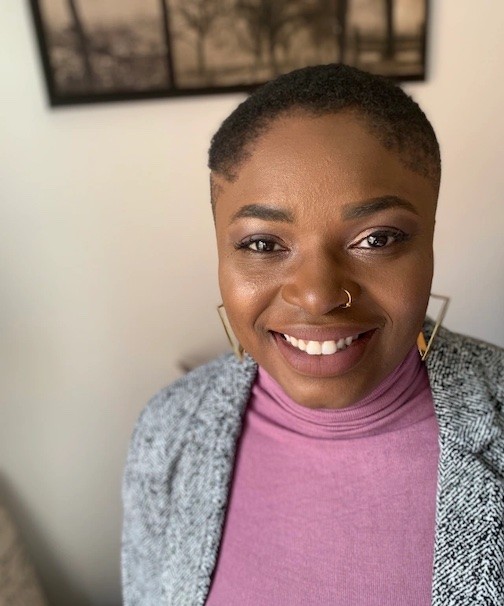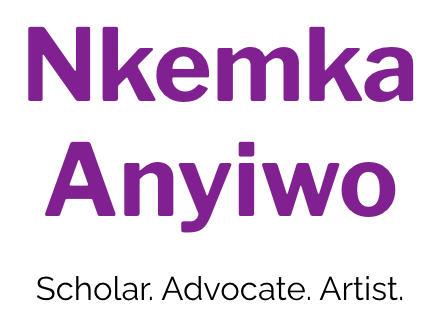Faculty Profile: Nkemka Anyiwo
Nkemka Anyiwo, Assistant Professor in the School of Social Work, spoke with us about her research and about being part of the inaugural Race and Racism Scholarship cluster hire.
Can you describe your background and upbringing, and about the first inklings of your interest in your current field?
I was born to Nigerian immigrants. I was the third of four children, and my father actually is a professor. Very early on, I had exposure to multiple cultural contexts, really growing up in many ways in an HBCU educational context. My mom connected us to Nigerian cultural heritage events and organizations, so I think culture always played a role in my life.
What's interesting about that, however, is that, even though my parents were definitely passionate about culture, they also had a different cultural experience than a lot of Black people in America. Being immigrants, they came from an all-Black nation when their ethnicity as Igbo was more salient than race. Then they came to the United States and had to contend with what it meant to be Black here. That happened simultaneously; they were raising us and trying to understand the racial politics of America.

Because of this, In addition to messaging from parents, I pulled from multiple sources—different cultural organizations, after school programs, and media—to inform how I think about and make meaning of race, because though my parents could give me some information, they were also learning and contending with it as immigrants to the United States. I think that my cultural background, and being the child of Black immigrants specifically, played a substantial role in me understanding race relations, and particularly inspired me to pull from multiple sources to define myself and understand myself.
I take a similar approach in my work, examining the multiple sources that young Black youth pull from to inform how they think about themselves and how they navigate the racial landscape.
Can you describe your research interests?
My work really speaks to understanding how young people define themselves. What are the cultural and social experiences that shape how Black youth determine what it means to be a Black person and contend with multiple aspects of their identity?
The goal is to understand how these socialization mechanisms and their self-concept supports them in thriving psychologically and in contending with racial inequality and oppression. My ultimate goal is supporting young people's ability to thrive; to be affirmed and feel good about themselves and also develop skill sets and be empowered to facilitate healing and social justice in their own communities as well. By amplifying their voices they can have substantial impact in shaping the communities that they seek to have.
In the aftermath of the murders of George Floyd and others, issues of race and racism were brought to the fore during a time when there was a very captive audience. How has your research been affected by this?
You know my work has always taken into consideration these contextual factors, these real life events that Black kids experience. As a young person, I was involved in social justice efforts; I was organizing as a high school kid to develop programming and to educate my peers around racial justice, and as a college student, I was organizing around racial justice and gender issues.
While the George Floyd incident was salient to the world, as a Black woman in America, I am conscious of how frequently these types of these incidents happen. I think that my lived experience as a Black person in America has probably been even more impactful in shaping my research. But it did have an impact on my current project, trying to understand how people make meaning of race.
"My ultimate goal is supporting young people's ability to thrive; to be affirmed and feel good about themselves and also develop skill sets and be empowered to facilitate healing and social justice in their own communities as well."
I was ready to launch that project, and then COVID hit, and then the uprising happened, and so I had to take a moment and step back and think through what it means to do this kind of work right now. As young people are navigating this intense stress, they can't go outside. And you have this huge racial uprising, I had to be thoughtful about what it means to show up and be like “Okay, let me ask you these questions? I asked myself, “Can I take a step back?” I think that, in general, I really appreciate community-based efforts and this particular project was not initially designed that way.
I had to take a step back from data collection for at least a year because I wanted to make sure the kids are doing well. I'm going to be sensitive. As I was designing and asking questions, I needed to take into consideration all that they're dealing with.
What do you see is the role of social work as a discipline, and also your role within social work? How do you situate your body of research and discipline of social work?
One thing that's powerful about social work is that there's often a grounding in social justice. I also know that social work has had an historically ambivalent relationship with a lot of marginalized communities. And so, even though there's a social justice lens through social work, it also has this contentious history. But I think that there's a great opportunity in social work because, in many ways, the discipline operates as a lens to do the work.
There is a structural lens to change systems and not just consider the individual. How does this individual function in the broader system, how do we adjust the systems that shape this person's lived experiences? I’m grateful for that lens, because, in my training in psychology, it is very much about the individual and maybe it's the individual in relation to the context. Having that structural lens to examine the systems that shape that individual’s lived experiences and, yes, we can intervene on the individual, but if you don't intervene on the systems, you know that doesn't necessarily create the change that is necessary. I think the power of social work is having that broader social structural lens and for grounding in social justice as the aim for the work.
"How does this individual function in the broader system? How do we adjust the systems that shape this person's lived experiences?"
What led you to focus on youth, and specifically, adolescence, as a developmental stage to study?
Research is me-search, as they say. I think of my lived experience as an adolescent, particularly because young people don't often have spaces to unpack and dissect things. As a college student I had more spaces to tap into, clubs and things like that. As a high school student, you really only have access to what people give you in many ways. I think it's a powerful and important time to engage in these critical conversations and make an impact.
It’s also a critical period for identity development or they're trying to figure out who they are, what they believe. and I think that it's a powerful space to support them as they're preparing for that transition into adulthood as they're getting ready to have to vote right potentially or want to vote or have access to both, have more public social, political power and also contend with more social, political stressors. It’s important to help them understand their experiences and then prepare them for that journey that they're going to embark on.
What opportunities do you see for yourself, as part of this inaugural Race and Racism cluster?
I believe in interdisciplinary or even transdisciplinary work. I think the most powerful impact we can have is when we pull from multiple disciplines and tackle issues and challenges and amplify things that are going well. We can avoid being so deficit-based, instead coming together to continue the growth of things that are going well. When you have folks from a legal perspective, from a medical perspective, from a psychological perspective, and from an economic perspective, tackling these systems that are intertwined, that becomes more powerful and more impactful. I am really excited to learn from my colleagues, to build community, to have opportunities to collaborate and work together collectively toward racial justice.
You’re also moving to New York, an enormous city.
Being in a city that is so diverse is exciting for me. You can talk about Black youth, you know you have Black people from all kinds of places with all kinds of different experiences. I think this is exciting as a media scholar, and as a scholar of creativity and art.
Being in the city where hip hop originated, it’s exciting to think about the cultural movements, poetry, and music and all kinds of things that the young people are involved in. That's something that I haven't explored as extensively in my work today but I really look forward to tapping into those creative movements and learning about how those things are supporting young people and hearing their voices and hearing their brilliance as well.
Looking at your website, I noticed that you describe yourself as an artist, so I’m curious: what type of art do you make?
As a young person I was into spoken word and also into hip hop, I'm a hip hop artist as well. That was very instrumental in my ability to express myself and find myself, so going back to the idea of identity. I was able to find myself through creative expression, and I think as an adult I've been able to heal myself and empower myself and encourage myself through creative expression. I’m looking forward to building a community of other artists and to finding spaces to strengthen my craft and share creative work as well.
I know a lot of faculty feel the need to separate their creative work from the rest of what they do to keep some kind of distance, but I hope that you find ways to weave it in. It's so important for students to see all of who we are.
I appreciate you saying that because I’ve been navigating that myself. I recently changed my website to add that. I literally study this and it is a huge part of who I am. The idea that we're impartial as researchers is just a lie; we bring our whole selves into the questions we ask and I think that our questions are even better and are sharper when we acknowledge our identities and lived experiences and the way we express ourselves. I want to use my art as a tool to talk about the research that we're exploring and find ways to do it in a way that folks will be able to receive.
